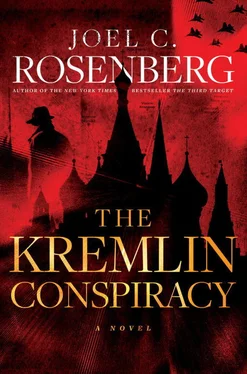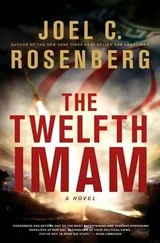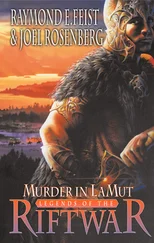Vasily Malenchenko, a prominent investigative journalist for Novaya Gazeta , one of the city’s most influential newspapers, reported that the explosion had been caused by a large bomb in the building’s basement. Malenchenko was well-known for having excellent sources inside the police department and other state security services. He reported that the bomb had been attached to the gas furnace. He also reported that there were no solid leads yet as to who was behind the attack, but the working theory among senior officials was that this was the work of Chechen rebels.
For days the government refused to either confirm or deny Malenchenko’s coverage. Yet everyone in Moscow and throughout Russia was fixated on his reports. Certainly Oleg’s neighbors and his colleagues in his office were all talking of little else. They had all seen the news. They had seen the smoking, gaping crater, the wrecked concrete, the twisted bicycles. They’d seen the severed arm hanging in a tree, an iconic image Oleg feared he would never forget. Ninety-four Muscovites were dead. Hundreds more were wounded. Burned. Disfigured. Shattered.
Oleg had seen the interview, if you could call it that, with a man who had lost his wife and daughter. Apparently the man had just gotten into a cab. He’d been heading to the airport on business when his apartment had exploded right behind him. The reporter had tried to ask the man questions. She’d done it gently, respectfully, but the man could not answer. He had simply wept unashamedly and uncontrollably, convulsing with wrenching, unceasing grief.
Unlike the attack in Dagestan, this one had unnerved Oleg. As he had stared at the incomprehensible images flickering across his television, he’d actually mumbled aloud what everyone in Moscow was thinking at the time: “It could have been me.”
Now, just four days later, it had happened again.
3

Panic was spreading across the country.
Oleg briefly thought about turning his car around and heading back to his parents’ home. Driving into the heart of Moscow seemed foolish. This morning’s attack had occurred less than a kilometer away from his own flat. What was next?
Still, he had business in the city. He’d waited for this day, planned for it more meticulously than for any trial. So he stayed on course, weaving through stop-and-go traffic for the next hour and a half, heading east into the heart of the capital. As he did, Oleg continued listening to the anchors and reporters on the radio providing further updates and analysis, trying like the ten million other residents of Moscow to process what it all meant. Innocent men, women, and children were dying. They were dying at night. In their sleep.
Oleg recoiled at an ugly, unsettling new thought: Could this be what his dream had been about? Could his building be next? Or his parents’ house? Were the places he had known and loved and called home all his life about to go up in flames? Was he about to die—alone, unmarried, barely twenty-seven years old?
Oleg had never had premonitions before. The very notion was ludicrous. He was an educated man. He’d graduated from Moscow State University, the finest in the country. He was an up-and-coming lawyer, making an excellent living. His clients included major Russian oil and gas companies. He wasn’t religious or even superstitious. He suddenly felt grateful he hadn’t sat down for breakfast with his mother. What if he’d told her about his dream? And she’d told others? He would have sounded crazy. Some things were best kept private.
Just then a new and rather odd piece of information came over the radio. During a live interview, Vasily Malenchenko, the journalist with Novaya Gazeta , told a Moscow radio station that investigators at the scene of the blast were puzzled by finding not only traces of TNT but also a substance known as hexogen.
“What is hexogen?” asked the radio reporter.
“It’s an explosive compound,” Malenchenko said.
“Like TNT?”
“Actually, it’s far more powerful.”
“So why’s that odd?” pressed the reporter. “Isn’t that what you’d expect at the site of a bombing?”
“No, not really, not in a terrorist attack like this,” Malenchenko insisted.
“Why not?”
“Because terrorists shouldn’t be able to get their hands on hexogen,” he said. “It’s only used by the military.”
A shudder rippled through Oleg’s body as he turned onto Third Ring Road, heading southeast. Was someone inside the Russian army helping Chechen terrorists? Had it come to this? He couldn’t imagine anyone cruel enough to perpetrate such atrocities. Who were these people?
Marina’s father would know, he thought. Maybe not today, but soon, and he would know how to stop them. He would know how to make them truly suffer for this grave injustice. This gave Oleg a small measure of comfort.
He crossed the river and inched along New Arbat Avenue, past the exit to the massive U.S. Embassy compound off to his left and the exit to the British Embassy and the Hard Rock Cafe—a favorite hangout in his youth—to his right. A few blocks up, but still progressing far too slowly, he decided to get off the main thoroughfare and zigzag through a series of side streets until he reached Kremlevskaya Nab. Finally, with only minutes to spare, he parked his Mercedes in a public garage behind the GUM department store, grabbed his briefcase, and headed for Red Square. The morning autumn air was cool and even a bit breezy, and Oleg was grateful he wasn’t heading to this meeting in the dead of summer. Walking this far, this fast, he surely would have melted in his designer suit from London and wound up looking like a wreck by the time he got there. What’s more, there would normally have been hordes of visitors from all over Russia and around the world slowing him down. But not today.
On this particular Monday morning, there were no tourists on the streets whatsoever. They had all scattered to the wind. In their place, hundreds of police in riot gear were arriving. They were taking up positions around the State Museum, around Lenin’s Tomb and St. Basil’s Cathedral, and of course, around the Kremlin itself. Armored personnel carriers were being moved into position at various points to cut off all access to the square. Not one but two police helicopters were circling overhead. Moscow was moving to a war footing.
4

Despite the clock, Oleg dared not break into a run to get to the meeting on time.
He feared he’d be arrested, if not shot, for doing so. Rather, he walked as briskly as he could without arousing suspicion. Yet even as he did, he wondered if it was prudent to proceed at all. Surely his meeting had been canceled. No civilians in their right mind were anywhere to be seen. Perhaps it really was best that he head back to his parents’ home and reschedule. But still he kept moving forward.
By the time he had skirted the enormous redbrick walls of the Kremlin and made it to the visitors’ center at the Kutafiya Tower, it was clear to Oleg he would not have any lines to wait in. Police carrying automatic weapons were buttoning up every entrance to the seat of the Russian government. All tours had been canceled, as had all but the most essential meetings. Oleg showed his ID to one policeman after another and explained why he was there and with whom he was meeting. Each time—to his astonishment—he was permitted to proceed. When he made it to the appointments desk, he slid his papers into the drawer and waited for the guard behind the bulletproof glass to review them.
Читать дальше














